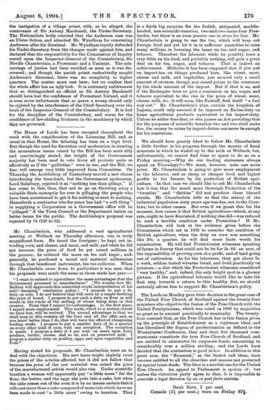Having stated his proposals, Mr. Chamberlain went on to deal
with the objections. His new taxes might slightly raise the prices of the articles affected, but it did not follow that because the price of the raw material was raised the price of the manufactured article would also rise. Under scientific taxation a woman will apparently pay " a little more"" for the flour, the butter, and the eggs she puts into a cake, but when the cake comes out of the oven it is by no means certain that it will cost more than a cake composed of materials which have no been made to cost "a little more" owing to taxation. That is a fairly big surprise for the foolish, antiquated, muddle- headed, non-scientific-taxation, two-and-two-make-four Free- trader, but there is an even greater one in store for him. Mr. Chamberlain is going to use the tax, which will keep out foreign food and yet let it in in sufficient quantities to raise. many millions, in lowering the taxes on tea, and sugar, and tobacco. Therefore the labourer, while he possibly loses a very little on his food, and probably nothing, will gain a great deal on his tea, sugar, and tobacco. That is indeed an achievement. Hitherto it has been supposed that if you put an import-tax on things produced here, like wheat, meat, cheese and milk, and vegetables, you secured only a small amount of revenue, though you raised prices to the consumer by the whole amount of the impost. But if that is so, and if the Exchequer tries to give a remission on tea, sugar, and tobacco equivalent to the rise in the price of wheat, meat, cheese, milk, &c., it will soon, like Falstaff, find itself " a foul way out." Mr. Chamberlain's plan, outside the kingdom. of Laputa, could only succeed if he imposed an Excise-duty on home agricultural products equivalent to his import-duty. Unless he either does that, or else passes an Act providing that for the purposes of scientific taxation two and two shall make five, the money he raises by import-duties can never be enough for his remissions.






































 Previous page
Previous page